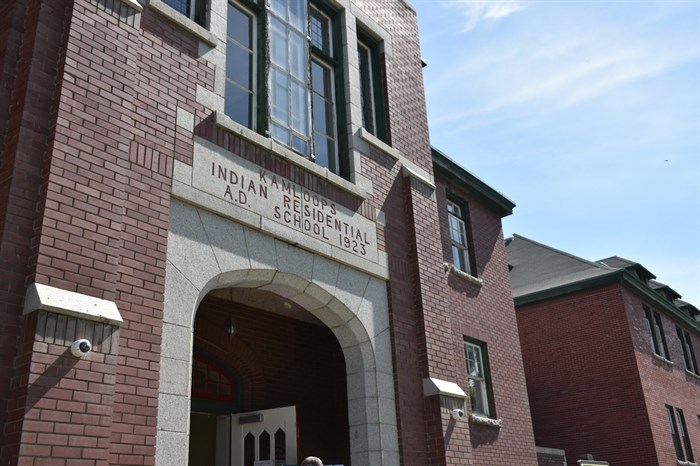
(LEVI LANDRY / iNFOnews.ca)
July 27, 2024 - 7:00 AM
A Secwepemc protester's attempt to appeal her criminal sentence was denied after arguing the Kamloops judge who locked her up for four weeks was biased.
Miranda Dick was sentenced to 28 days in jail more than two years after she was arrested during a Trans Mountain pipeline protest. Although she served her time, she took her sentence up with the BC Court of Appeal in April.
She claimed BC Supreme Court Justice Shelley Fitzpatrick "incurably tainted" the proceedings when she clarified the radar work at the former Kamloops Indian Residential School found "potential" graves. Dick argued it revealed the judge's bias, according to a July 22 appeals court decision.
The comment came at the conclusion of a lengthy trial involving eight protesters who were charged with violating a court order when they protested a pipeline worksite near the Kamloops airport in 2020.
READ MORE: Tk'emlups designates ancient burial site on Thompson River 'sacred'
Defense lawyer Benjamin Isitt was delivering submissions for one of the other accused, describing some of the community work she had done. One of those examples was working with a Lower Mainland First Nation on a project to plant trees in honour of the 215 children at the Kamloops Indian Residential School "whose bodies have been unearthed," Isitt said.
"There's no bodies that have been unearthed," Fitzpatrick interjected.
Isitt admitted he was mistaken and said the remains had been "identified through ground penetrating radar."
"Potential," Fitzpatrick added.
There was an outburst in the court from the gallery, including accusations that the judge was racist. It's not clear how many, but sheriffs then removed people from the courtroom, according to the decision.
Dick argued the inference of Fitzpatrick's comments suggested the allegations of unmarked graves are "false, fabricated or otherwise untrue."
Her appeal would ultimately be dismissed in a decision from Chief Justice Leonard Marchand Jr., whose father attended the Kamloops Indian Residential School and later became Canada's first Status Indian MP and the first Indigenous federal cabinet minister.
The Court of Appeal acknowledged Isitt raised a "particularly painful and sensitive subject" for Canadians, especially for former residential school students and their communities, but continued to say the findings Tk'emlups and many other First Nations announced have long been described as "potential" graves.
READ MORE: SWEPT AWAY: Another near river drowning in Kamloops prompts call for action
"The circumstances of the interaction between the judge and defence counsel demonstrate the judge was aware of the inquiry into unmarked graves and burial sites at residential schools in Canada. The judge clarified and corrected defence counsel’s inaccurate submission that human remains had been “unearthed” at the site of the former Kamloops Indian Residential School," Marchand said.
"It was the judge’s subsequent use of the word 'potential' that caused uproar and hurt. However, that word is the very same word Indigenous communities and others have used to describe the results of tests using ground penetrating radar in and around former residential school sites."
The appeals court judges did not argue the Truth and Reconciliation Commission's finding that there were thousands of deaths in the residential school system, but it did cite a June 2023 Special Interlocutor report that referred to radar findings at several First Nations as "potential unmarked burials," including those at Tk'emlups te Secwepemc.
"I accept her protest was driven primarily by her identity as a Secwepemc woman. But, purposefully disobeying a court order comes with consequences. For the reasons set out above, the consequences imposed by the sentencing judge were not tainted by bias or reversible error," Marchand said in his decision.
The more than 200 suspected graves haven't been excavated and it's not clear whether Tk'emlups will opt to do so. Kukpi7 (Chief) Rosanne Casimir has resisted calls to do so, which are frequently demanded by those who deny their existence. Tk'emlups once had to oust people from their land who arrived with shovels to do the excavation themselves, while critics even called the unmarked graves claim a "hoax."
There was always a "knowing" among Elders in the community that there were graves in the orchard, Casimir said, and the radar work verified that knowing.
But Tk'emlups' reluctance to conduct further work to prove the existence of those graves and identify whose remains are there led Marchand to agree with Fitzpatrick that they remain "potential" unmarked burials, rather than side with Dick.
Marchand, whose own family attended the residential school, cited the 2015 Truth and Reconciliation Commission's findings that Indian residential schools had a high mortality rate and there were unmarked graves. One of its 94 calls to action included identifying and marking unmarked graves.
To contact a reporter for this story, email Levi Landry or call 250-819-3723 or email the editor. You can also submit photos, videos or news tips to the newsroom and be entered to win a monthly prize draw.
We welcome your comments and opinions on our stories but play nice. We won't censor or delete comments unless they contain off-topic statements or links, unnecessary vulgarity, false facts, spam or obviously fake profiles. If you have any concerns about what you see in comments, email the editor in the link above. SUBSCRIBE to our awesome newsletter here.
News from © iNFOnews, 2024